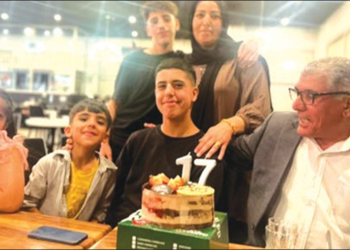October 08, 2021

A group of Iranian expats has launched a campaign against Farnaz Fassihi, the Iranian-American reporter for The New York Times who writes many of that paper’s stories about Iran, though she can no longer live there.
An open letter dated September 9 and signed by 92 people complains that Fassihi is guilty of “normalizing the Islamic Republic’s brutality through the obfuscation of truth in her journalism over the course of several years…. Her portrayal of Iran as a normal country shows a blatant disregard for the lived experiences of our people whose most basic rights are taken away from them.”
The letter says, “We seek to hold Farnaz Fassihi accountable for the misrepresentation of the current state of Islamic Republic’s brutal suppression, mass killing and imprisonment of peaceful protesters, journalists, conscientious objectors, political dissidents and countless ordinary citizens.”
The letter carries an attachment citing some specific examples of where the letter signers find fault with Fassihi’s work. For example, it says, “When the plot to kidnap [Masih] Alinejad in New York was revealed, Fassihi refused to even contact her or report on the matter.”
The New York Times carried a story on the case, but assigned a New York criminal justice reporter to write the story since it was a crime alleged to have been committed in New York. A note at the bottom of the article said, “Farnaz Fassihi contributed reporting.” The expat letter did not say where it got the information that Fassihi “refused” to contact Alinejad or report on the case.
In other cases, however, the letter contains a link to a specific story that the letter finds fault with.
For example, the letter complains about an August 13, 2021, article by Fassihi that complains she attributes Iran’s challenges from the coronavirus to the delta variant, when the real problem, the letter says, if that Supreme Leader Ali Khamenehi put a ban on importing Western vaccines. “Fassihi fails to hold Khamenehi accountable for the ban and thus, for the hundreds of thousands of covid-related deaths in Iran.”
The article the letter cites says:
“Medical personnel who were once afraid to speak out are now openly chastising what many Iranians see as gross misjudgment, incompetence and negligence in the nation’s leadership, from Supreme Leader Ayatollah Ali Khamenei on down.
“They are especially furious over a dearth of vaccines, which Iran’s leaders refused to purchase in time or in sufficient quantities, instead holding out for domestically developed alternatives that may be too late. They banned vaccines made in the United States and Britain, even rejecting donations, because Mr. Khamenei said they had been designed by the West to ‘contaminate other nations’.”
With regard to a November 19, 2019, article by Fassihi on the protests that erupted after the price of gasoline was tripled, the letter says, “Fassihi accuses the protesters of murdering several anti-riot forces.”
The article in question states: “Iran’s security forces said protesters had killed two police officers and at least five members of the Islamic Revolutionary Guards Corps and the paramilitary force known as the Basij.”
The letter says that in the same article, “Fassihi blames the Trump Administration for the economic crisis in Iran.”
The article says, “President Trump, whose sanctions are at least partly blamed for Iran’s economic travails, broke six days of silence on the protests.”
The letter says, “Fassihi also hints at the protests being fueled by the then US Administration.”
The article says, “Later Thursday, Secretary of State Mike Pompeo, who shares Mr. Trump’s antipathy toward Iran’s hierarchy, appeared to validate its suspicions that the United States was abetting the protests. In his own Twitter posting, Mr. Pompeo said that he had asked protesters to send him videos and other evidence of the crackdown, and that the United States would ‘expose and sanction the abuses’.”
The letter carries 92 signatures. Twenty-five of them are identified as relatives of people killed when the Islamic Republic shot down a Ukrainian passenger jet in 2020. Most of them are presumably residents of Canada.
The attacks on Fassihi date back many months and involve many social media postings. The New York Times responded last summer with a two-sentence statement: “Farnaz Fassihi is an accomplished reporter who has covered Iran for several decades. We are confident in the accuracy of her reporting for The New York Times.”
The exchanges over the months have gone beyond testy to very personal attacks on Fassihi. Fassihi has responded by dismissing her critics as trolls.
In late July she said, “Last week, they circulated a death threat video against me with my picture. They doxed my home address and called for people to find and attack me and rape me.” The Iran Times has not seen the video.
Fassihi was born in the United States to Iranian parents and grew up in Tehran and Portland, Oregon. She received her B.A. from the University of Tehran and an M.S. in journalism from Columbia University’s Graduate School of Journalism in New York City.


















